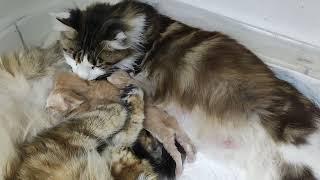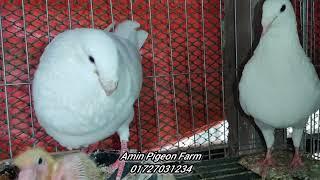Tuxedo cats, also called Tuxies, are known for their distinctive black and white coat pattern that resembles a classic tuxedo outfit.
In this video, we will talk about 15 interesting facts about these charming cats.
Tuxedo cats are not a single breed.
Tuxedo cats are not a particular breed. Instead, they get their name from the distinct bi-colored markings on their coats. Any domestic cat that is primarily black with white markings can be considered a tuxedo cat.
The majority of tuxies are domestic shorthair cats, but the coat variation is also seen in Persians, Maine Coons, British Shorthairs and the Devon Rex.
Tuxedo cats are just as likely to be female.
Unlike orange tabbies, who are usually male, or calico or tortoiseshell cats, who are almost always female, tuxies can easily be either sex.
This means there are an equal number of male and female tuxedo cats out there.
A Tuxedo cat almost became the mayor of Halifax.
Not many cats have run for political office. And there aren’t a lot of political parties started by cat breeds or types. But in the 2012 municipal elections, a black and white cat named Tuxedo Stan ran for mayor in Halifax, Canada. Yes, seriously!
He even created his own political party, The Tuxedo Party of Canada.
A Tuxedo cat was once the richest cat in the world.
A tuxedo cat named Sparky was owned by an incredibly wealthy owner. When the owner passed away in 1998, he passed all his money down to Sparky. Sparky's inheritance was around 6.3 million Dollars.
Tuxedo cats aren't limited to just black and white.
While you might expect "tuxedo" cats to sport coats just in the traditional black and white of the men’s formal attire they're named after, you might also spot "tuxies" in grey, orange, and silver.
Their coat pattern is random
Tuxedo cats get their coat patterns during development when they are in the womb. But it's not about genetics. A tuxedo cat can be born even if neither parent is tuxedo, they just need to inherit black and white genes.
In the past, scientists believe that tuxedo cats were produced as a result of slow-moving or sluggish pigment cells. It was believed that the black pigment cells would not reach every part of the cat's body before the cat was born. However, more recent studies suggest that the tuxedo markings are the result of a faulty KIT gene that is unable to multiply at a normal rate.
In either case, the result is a random pattern, so no two tuxedo cats will have the exact same pattern.
Tuxedo cats are Popular fixtures of pop culture
Tuxedo cats have been part of popular culture for longer than you might expect! Felix the Cat debuted in 1919 during the silent movie era, Sylvester the Cat first appeared in 1939, and Dr. Seuss’ Cat in the Hat first appeared in 1957.
Tuxies Are Popular With Famous People
Plenty of famous and influential people have owned tuxedos. Among the most well documented are William Shakespeare, Beethoven, Sir Isaac Newton, and even President Bill Clinton. That’s right, tuxies have also made it into the White House! Socks Clinton was the pet cat of the Clinton family.
They are among the least-adopted cats
Tuxies are undeniably adorable and can come from purebred kitties, from mix-bred cats and from feral cats. However, Tuxedo cats are among the least-adopted cats in shelters. According to a Priceonomics study, they have an unusually low adoption rate at just below 70%.
It might be because tuxis are mostly black and studies show that black cats are less likely to be adopted than cats of other colors.
Their whisker colors match their muzzle color
A cat’s whisker color will match its hair color. This means that if you have a pure black cat, it will have black whiskers. Most Tuxedo cats have a bright white muzzle, which means their whiskers are white. Even cats with a grey muzzle area will have grey whiskers.
No Two Tuxedo Cats Are The Same
Similar to how no two fingerprints are the same, no two tuxedo coat patterns are identical either.
This means that your tuxedo cat’s coat is unique.
They are found all over the globe
Since tuxedo cats are not a particular breed but rather a coat pattern, they are not limited by geographical area. This means that unlike other cats which are more common in certain countries or regions, tuxedos can be found all over the world.
There are lots of Tuxedo myths
With such a charming and fancy looking cat, it's no surprise that there are plenty myths and rumors surrounding the tuxedos.
Some myths suggest that tuxedos have magical properties or that they have a certain personality, size, weight, or lifespan. All cats, ultimately, are individuals. Your cat will be who she is, based on her particular combination of genes, her upbringing and personal history, and whatever magic makes all of us who we are.
Another myth about the tuxedo is that they were worshiped by the ancient Egyptians, however there is no evidence to prove that this is true.
In this video, we will talk about 15 interesting facts about these charming cats.
Tuxedo cats are not a single breed.
Tuxedo cats are not a particular breed. Instead, they get their name from the distinct bi-colored markings on their coats. Any domestic cat that is primarily black with white markings can be considered a tuxedo cat.
The majority of tuxies are domestic shorthair cats, but the coat variation is also seen in Persians, Maine Coons, British Shorthairs and the Devon Rex.
Tuxedo cats are just as likely to be female.
Unlike orange tabbies, who are usually male, or calico or tortoiseshell cats, who are almost always female, tuxies can easily be either sex.
This means there are an equal number of male and female tuxedo cats out there.
A Tuxedo cat almost became the mayor of Halifax.
Not many cats have run for political office. And there aren’t a lot of political parties started by cat breeds or types. But in the 2012 municipal elections, a black and white cat named Tuxedo Stan ran for mayor in Halifax, Canada. Yes, seriously!
He even created his own political party, The Tuxedo Party of Canada.
A Tuxedo cat was once the richest cat in the world.
A tuxedo cat named Sparky was owned by an incredibly wealthy owner. When the owner passed away in 1998, he passed all his money down to Sparky. Sparky's inheritance was around 6.3 million Dollars.
Tuxedo cats aren't limited to just black and white.
While you might expect "tuxedo" cats to sport coats just in the traditional black and white of the men’s formal attire they're named after, you might also spot "tuxies" in grey, orange, and silver.
Their coat pattern is random
Tuxedo cats get their coat patterns during development when they are in the womb. But it's not about genetics. A tuxedo cat can be born even if neither parent is tuxedo, they just need to inherit black and white genes.
In the past, scientists believe that tuxedo cats were produced as a result of slow-moving or sluggish pigment cells. It was believed that the black pigment cells would not reach every part of the cat's body before the cat was born. However, more recent studies suggest that the tuxedo markings are the result of a faulty KIT gene that is unable to multiply at a normal rate.
In either case, the result is a random pattern, so no two tuxedo cats will have the exact same pattern.
Tuxedo cats are Popular fixtures of pop culture
Tuxedo cats have been part of popular culture for longer than you might expect! Felix the Cat debuted in 1919 during the silent movie era, Sylvester the Cat first appeared in 1939, and Dr. Seuss’ Cat in the Hat first appeared in 1957.
Tuxies Are Popular With Famous People
Plenty of famous and influential people have owned tuxedos. Among the most well documented are William Shakespeare, Beethoven, Sir Isaac Newton, and even President Bill Clinton. That’s right, tuxies have also made it into the White House! Socks Clinton was the pet cat of the Clinton family.
They are among the least-adopted cats
Tuxies are undeniably adorable and can come from purebred kitties, from mix-bred cats and from feral cats. However, Tuxedo cats are among the least-adopted cats in shelters. According to a Priceonomics study, they have an unusually low adoption rate at just below 70%.
It might be because tuxis are mostly black and studies show that black cats are less likely to be adopted than cats of other colors.
Their whisker colors match their muzzle color
A cat’s whisker color will match its hair color. This means that if you have a pure black cat, it will have black whiskers. Most Tuxedo cats have a bright white muzzle, which means their whiskers are white. Even cats with a grey muzzle area will have grey whiskers.
No Two Tuxedo Cats Are The Same
Similar to how no two fingerprints are the same, no two tuxedo coat patterns are identical either.
This means that your tuxedo cat’s coat is unique.
They are found all over the globe
Since tuxedo cats are not a particular breed but rather a coat pattern, they are not limited by geographical area. This means that unlike other cats which are more common in certain countries or regions, tuxedos can be found all over the world.
There are lots of Tuxedo myths
With such a charming and fancy looking cat, it's no surprise that there are plenty myths and rumors surrounding the tuxedos.
Some myths suggest that tuxedos have magical properties or that they have a certain personality, size, weight, or lifespan. All cats, ultimately, are individuals. Your cat will be who she is, based on her particular combination of genes, her upbringing and personal history, and whatever magic makes all of us who we are.
Another myth about the tuxedo is that they were worshiped by the ancient Egyptians, however there is no evidence to prove that this is true.
- Catégories
- Chats de Race Devon Rex














Commentaires